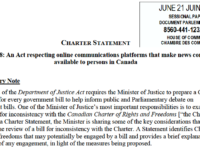Last Tuesday, Justice Minister David Lametti tabled his department’s Charter statement for Bill C-18, the Online News Act. A link to the statement appeared briefly on the department’s website, but by the end of the week reference to the Bill C-18 Charter statement was removed from the Justice site altogether. As of this morning, there is still no reference to the statement, even though it is a public document having been tabled in the House of Commons. In fact, I have now obtained a copy of the Charter statement and posted it publicly here with an embed below. The department will presumably re-post the statement at some point and it would be useful to confirm that it remains unchanged and provide an explanation for the online removal (I asked and did not get a response). [UPDATE: Hours after this blog post went live, the government posted the Charter statement.]
Blog
CRTC Chair Ian Scott Confirms Bill C-11 Can Be Used To Pressure Internet Platforms to Manipulate Algorithms
The Senate Standing Committee on Transport and Communications held an exceptionally important hearing as part of its Bill C-11 pre-study (which is about to change into a Bill C-11 study) last night featuring Canadian Heritage officials and CRTC Chair Ian Scott. I will have a second post on the officials, who struggled to provide clear answers to basic questions on everything from how to identify what counts as Cancon for user content (Youtube’s Content ID was suggested) to the absence of thresholds for what is covered by the bill (there are no thresholds and the government wants the ability to also target small streamers). But the key moment of the day came in questioning Scott about the discoverability and the potential for algorithmic manipulation.
My Appearance Before the Senate Transport and Communications Committee on Bill C-11: The Senate Starts Review As Bill Receives House Approval
The Senate Standing Committee on Transport and Communications started its Bill C-11 pre-study yesterday just hours before the the bill passed third reading in the House of Commons. The bill quickly moved to first reading in the Senate, though at this stage it would appear that there will be just one more hearing involving departmental and CRTC officials before the summer recess. The House vote was widely expected as the government received support from the NDP on several occasions to limit debate. The Bloc and Green MP Elizabeth May also supported the bill, while it was opposed by the Conservatives and Green MP Mike Morrice.
I was pleased to appear before the Senate committee together with former CRTC Chair Konrad von Finckenstein as part of its first panel of the day. The questions and answers touched on a wide range of issues including discoverability and public support for the sector. My opening remarks are posted and embedded below:
Bill C-11 Enters a Danger Zone: Government Shifts from Ignoring Witnesses on User Content Regulation to Dismissing Criticisms as “Misinformation”
The Standing Committee on Canadian Heritage heard from a total of 48 witnesses as individuals or representing organizations during its study of Bill C-11 (excluding the CRTC and government officials). Of those 48, at least 16 either raised concerns about the regulation of user content in the bill or disputed government claims about its effect. Liberal, NDP and Bloc MPs proposed and voted for amendments in Bill C-11 raised by a single witness or organization, but somehow the testimony of one-third of the witnesses, which included creators, consumer groups, independent experts, Internet platforms, and industry associations. was ignored.
The government’s decision to ignore the overwhelming majority of testimony on the issue of regulating user content damages the credibility of the committee Bill C-11 review and makes the forthcoming Senate study on the bill even more essential. But the government went beyond just ignoring witness testimony yesterday in the House of Commons. It now claims those views constitute “misinformation.” Tim Louis, a Liberal MP who is on the Standing Committee on Canadian Heritage and sat through hours of testimony, said this in the House of Commons yesterday:
The Groundhog Day Privacy Bill: The Government Waited Months to Bring Back Roughly the Same Privacy Plan?!
Innovation, Science and Industry Minister François-Philippe Champagne yesterday unveiled Bill C-27, the updated privacy reform law. While Champagne described it is a “historic day”, the bill is better described as a case of Groundhog Day, since it looks an awful lot like the last privacy bill that died with last year’s election call and which never even advanced to the committee stage. I wrote earlier this week about the government’s seeming indifference to privacy and this bill doesn’t do much to change the analysis as the bill raises many of the same questions and will likely face similar opposition.











